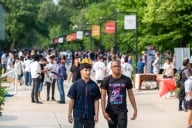You have /5 articles left.
Sign up for a free account or log in.
Most readers of Inside Higher Ed know of the fracas that followed an x-rated, after-class demonstration for a psychology course at Northwestern. I was not there and leave it for others to judge whether Professor Bailey crossed a critical line between the educational and the exploitative. However, I think the international attention given the event reflects its perfect storm of academia’s greatest sensitivities.
Sex and scholarship persist as a potent combination. Harvard has grappled most openly with the long tradition of physical affairs born of pedagogical relationships. The poster-couple held up to defend these unions as the natural products of shared passions - a opposed to the seductive nature of power whether wielded with guns or grades - remains the illustrious economist John Kenneth Galbraith and his student turned spouse, Catherine. Anyone working in the academy knows more recent examples of classroom conversations concluded between bed sheets.
These heterosexual scholars’ unions play to traditional romantic fantasies of male mentors rescuing shy yet smart girls (Mr. Rochester and his Jane) or honing the rough edges of the precocious but unpolished (Henry Higgins and his Eliza). We may question the power relations in the resulting unions (I intentionally employ the possessive above), but they underscore as opposed to overturn normative assumptions about sex. In the days before such seductions raised eyebrows, a bright young woman at whom no instructor made a sexual advance questioned the attractiveness of her brain and her body.
The homo-social nature of many education institutions from ancient Athens to post-war Princeton raised the spectre of homosexual relations hidden among the ivy. This nexus of power, passion, and pedagogy proved more threatening to the veneer of upward mobility via the university. Send your sons or daughters into a homo-social institution and they might stay for the protection of a homo-sexual safety zone. For parents petrified of ‘perversion,’ this possibility invoked terror in a way the prospect of their daughter’s wedding to a respected professor never could. In Germany, such a daughter would bear the lofty title “Frau Professor Doktor.” Her gay brother might be a Professor Doktor, but his partner would never gain public recognition let alone his title. No progeny would secure familial status when the aggrieved would-be grandparents had gone to their graves.
The academy continues to roil with anxiety over permuted passions. David Brooks recently wrote that “...people learn from people they love.” The comment contains the best and worst that higher educational institutions have to offer. Students must love to learn; instructors must love to teach; but the line between the types of love is far more fragile than CS Lewis would like to believe. In 1993, an editorial in the Harvard Crimson declared, “One of the biggest sparks for any relationship can come from shared interests. Isn't it logical that such commonality could be found between an instructor who teaches a particular course and a pupil with enthusiasm for the subject matter?” Physical passions can indeed ignite from intellectual ones, but the differential in power between pedagogues and pupils ought to extinguish the flames no matter how noble.
Allowed to burn, the ring of fire encircles far more than the lovers. The special student’s special relationship enrages peers. The faculty philanderer makes his or her colleagues check every movement and comment for fear that they too will be thought to desire more than a student’s ideas. We talk with doors open and desks between us to avoid the slightest sniff of impropriety.
I think parents’ fear that their sons and daughters will engage in ill-advised sexual dalliances on campus played a greater role in the Bailey brouhaha’s appearance on the BBC homepage than their disgust at those sons’ and daughters’ view of an non-collegiate couple’s ‘deviant’ behavior. Professor Bailey projected the sexual tension that runs through much of academic life on stage in living color. It reminded everyone of the potential for pedagogical relationships to harbor sexual content, and the world squirmed.
Elizabeth Lewis Pardoe is a regular contributor at University of Venus. She is associate director of the Office of Fellowships and a faculty affiliate in History and American Studies at Northwestern University, where she received her B.A. She earned her M.Litt. and M.Phil. degrees in European History as a Marshall Scholar at Cambridge University before completing her Ph.D. in American History at Princeton University. For more, visit http://elizabethlewispardoe.wordpress.com.








